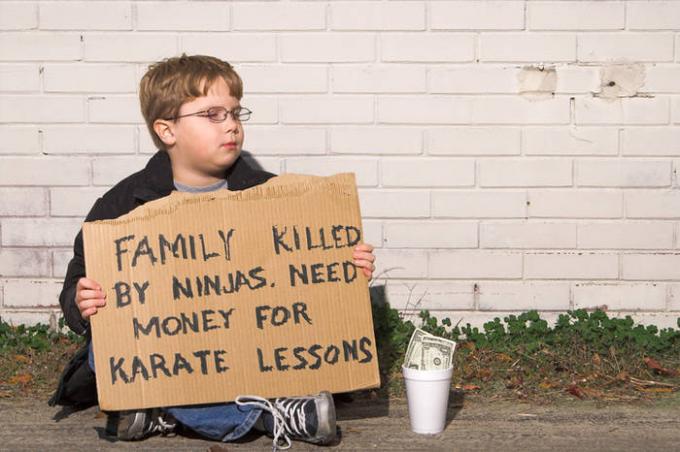How to raise a child's financial literacy and teach him to properly handle money?
Previously it was thought that the question money It applies only to adults, and children should keep quiet, less demand and respect the work of the parents. However, without proper training the child will not soon will understand the value of money and the rules for handling them. What errors most often allow parents in the financial education of children?








The lack of financial education as such
That is the theme of money in a conversation with a child is raised only at the level of "no money" and "money is." It is always easier to respond to the child that mom "no printing press for money" than to touch on a more serious level. In fact, to talk to children about money as adults need a very young age. The child should clearly understand that the money did not come from out of nowhere, not from an ATM, and earned difficulty mom and dad that their wasting not only sweets and entertainment, but also on the useful and necessary things.
The lack of pocket money
Parents are often reluctant to allocate the children pocket money, because they think that they spend it on "nonsense" and sweets. Perhaps some of this is indeed the case. But very quickly the child will understand that the amount of money he is limited, and desires - limitless. Accordingly, the need to save somewhere to somewhere to spend more. Without having at its disposal own funds of a child does not learn self-reliance and to gain valuable experience of dealing with money. Psychologists advise to allocate a fixed amount for children once a month or a week since 6-7 years. And with age the amount should increase gradually. It's okay if a 7-year-old child will spend all the money on sweets and toys, as early as 12-14 years he will learn to properly allocate costs to be enough for entertainment, gifts to friends and other spending.
Full control of the children's expenses
At first, the child will almost inevitably make mistakes in their spending. The task of parents - to prompt options competent distribution of money to offer help (but do not force), while trust and do not scold for purchases. If you give a child money - they already belong to him, so he can dispose of them, without accounting to you. If you do not like what the child spent the money, you can gently remind him what he wanted, for example, to save the game for consoles, but now purchase is delayed. However, it should not be a criticism, mocking tone and censure. Without their own mistakes the child does not acquire valuable experience.
Complete lack of control, like a child to manage money
If you know that a child spend the money, but he did not bring home, not telling you about the costs - is an occasion to ask and ask questions. Perhaps he take the money the school extortioners, or he gambles / bets or buying drugs, which, unfortunately, happens.Before the child should bring, he can always count on your support, advice and understanding. Explain that it is not necessary to show off the fact that you have the money among peers, because it can attract the attention of those who will be able to select them.

Money for good grades
The main task of the student - get the knowledge and use them to build a successful future, a profession. And its implementation must not depend on whether the child's parents have paid or not. It is the goal to which you want to go to receive future salary at work. And the assessment - this is not an indicator of knowledge. Psychologists advise not create a binding to the estimated money.
Fee for home help
Another bad bunch - money and household chores. All who live in the home, should take care of part of it. Mom and Dad do not get money for the cleaning, washing and cooking. Accordingly, the child must perform the task feasible for him without requiring any cash in return. If the child has to spend a lot of time on a regular basis on the domestic order - think for him more, not monetary incentives.
Suggestion child that money - this is the main
The child must understand that money - it's a tool with which you can get a certain freedom and possibilities. However, they are not exempt from responsibility before the law and the people. And the amount of money you can not judge a person's identity. The task of parents to bring that wealth - is only one of the components of success, and therefore should not be an end in itself.
Manipulation of-pocket costs
Isolation of pocket money should be as consistent and predictable as all general education. That is necessary "on the bank" to agree on rewards and punishments, the child already knew, because of what may lose money. It should not depend on the momentary mood of parents or be a way to influence the behavior of the child. The task of pocket money - to teach the child to be independent and financially literate and do not force him to do as parents want.You will be interested to know 5 ways to make money Instagrame.

